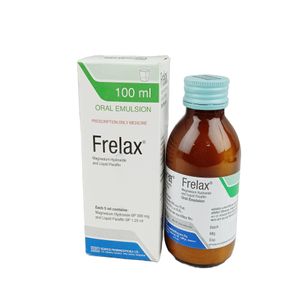Frelax Uses, Dosage, Side Effects and more
This is a dual-relief formulation containing Magnesium Hydroxide as an osmotic laxative and Liquid Parafn as a lubricant. The osmotic laxative works by drawing water into the bowel, which softens the stools and lubricant makes them easier to pass out of the body. It is recommended for the temporary relief of constipation.

| Attribute | Details |
|---|---|
| Trade Name | Frelax |
| Generic | Magnesium Hydroxide + Liquid Paraffin |
| Weight | (300mg+1.25ml)/5ml |
| Type | Oral Emulsion |
| Therapeutic Class | Antacid with laxative action |
| Manufacturer | Beximco Pharmaceuticals Ltd |
| Available Country | Bangladesh |
| Last Updated: | January 7, 2025 at 1:49 am |
Uses
Magnesium Hydroxide & Liquid Paraffin oral emulsion is used for Constipation, Hyperacidity with constipation, Anorectal disorder, Post-operative constipation, Constipation associated with chronic cholecystitis, Hernia
Frelax is also used to associated treatment for these conditions: Acid indigestion, Colic, Constipation, Dyspepsia, Flatulence, Gastric Ulcer, Heartburn, Upset stomach, Antacid therapy, Gastric Acid Suppression
How Frelax works
The suspension of magnesium hydroxide is ingested and enters the stomach. According to the amount ingested, the magnesium hydroxide will either act as an antacid or a laxative.
Through the ingestion of 0.5-1.5 grams (in adults) the magnesium hydroxide will act by simple acid neutralization in the stomach. The hydroxide ions from the magnesium hydroxide suspension will combine with the acidic H+ ions of the hydrochloric acid made by the stomachs parietal cells. This neutralization reaction will result in the formation of magnesium chloride and water.
Through the ingestion of 2-5 grams (in adults) the magnesium hydroxide acts as a laxative in the colon. The majority of the suspension is not absorbed in the intestinal tract and will create an osmotic effect to draw water into the gut from surrounding tissues. With this increase of water in the intestines, the feces will soften and the intraluminal volume of the feces will increase. These effects still stimulate intestinal motility and induce the urge to defecate. Magnesium hydroxide will also release cholecystokinin (CKK) in the intestines which will accumulate water and electrolytes in the lumen and furthermore increase intestinal motility.
Dosage
he recommended oral doses are as follows-
- Adults and children over 12 years: 15-30 ml before breakfast or at bedtime.
- Children over 7 years: 7.5 ml-15 ml at bedtime.
- Children over 3-7 years: 5-10 ml at bedtime.
The dose may be mixed with milk or half a glass of water if desired.
How Long Does It Take to Work?
How Long Does It Take to Work? see here Frelax
Side Effects
Rectal irritation, potassium loss (thirst, weakness,nausea and diarrhea).
Toxicity
LD50=8500 mg/kg (rat, oral)
Common side effects include drowsiness or flushing (warmth, redness or tingly feeling).
Daily use of magnesium hydroxide can result in fluid and electrolyte disturbances.
Excessive use of the laxative effects of magnesium hydroxide may result in abdominal cramping, nausea and/or diarrhea.
In overdose, symptoms of gastrointestinal irritation and/or watery diarrhea may occur.
Magnesium hydroxide poisoning can result in hypermagnesemia which includes symptoms of: nausea, vomiting, flushing, thirst, hypotension, drowsiness, confusion, loss of tendon reflexes, muscle weakness, respiratory depression, cardiac arrhythmias, coma and cardiac arrest.
Not to be used in individuals with any form of kidney disease or renal failure, a magnesium restricted diet or with any sudden changes in bowel movement lasting over two weeks. Also not to be used in those individuals with abdominal pain, nausea, vomiting, symptoms of appendicitis or myocardial damage, heart block, fecal impaction, rectal fissures, intestinal obstruction or perforation or renal disease. Not to be used in women who are about to deliver as magnesium crosses the placenta and is excreted in small amounts in breast milk.
Using magnesium hydroxide with aluminum hydroxide can decrease the absorption rate of these drugs.
Magnesium hydroxide can react with digoxin, dicoumerol and cimetidine.
Use of ibuprofen with magnesium hydroxide can increase the absorption of the ibuprofen.
Use of magnesium hydroxide with penicallamine, bisphosphates, ketoconazole, quinolones or tetracycline can decrease the absorption of these drugs.
Enteric-coated tablets can be prematurely released when taken with magnesium hydroxide.
It is important to routinely monitor levels of serum magnesium and potassium in patients using magnesium hydroxide. Serum magnesium levels are necessary to determine how much magnesium is being absorbed and how much is being excreted by the kidneys. Excessive diarrhea can occur from use of magnesium hydroxide and thus it is important to also monitor serum potassium levels to ensure hypokalemia does not occur.
Precaution
Renal and hepatic impairment. Maintain adequate fluid intake.
Interaction
Cimetidine, Diuretics, Famotidine and Ranitidine may cause irritation of stomach or bowel.
Volume of Distribution
The peak action and distribution of magnesium hydroxide are variable.
Elimination Route
About 15%-50% of magnesium hydroxide is absorbed very slowly through the small intestine.
Half Life
N/A
Clearance
Magnesium hydroxide is mainly excreted in the urine by the kidneys. Since the kidneys play a major role in its clearance, individuals with renal failure are at risk of hypermagnesemia with long term consumption as the appropriate amounts of magnesium may not be excreted.
Elimination Route
After oral administration, up to 50% of the magnesium hydroxide suspension may be absorbed as magnesium ions through the small intestines and then rapidly excreted in the urine through the kidneys. The unabsorbed drug is mainly excreted in the feces and saliva.
Pregnancy & Breastfeeding use
Can be used in pregnant women and lactating mothers only upon physician’s recommendation.
Contraindication
Acute GI conditions like abdominal pain.
Storage Condition
Store in a cool and dry place, protected from light.



